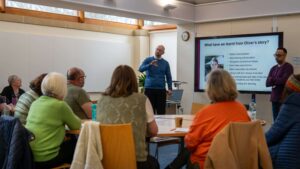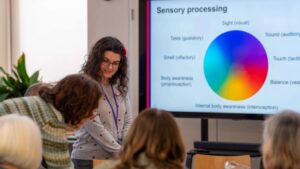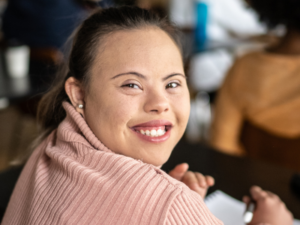Families and campaigners are speaking out after the tragic death of a man with learning disabilities has exposed a crisis in the care of people with learning disabilities and autism.
 Bereaved families of people with learning disabilities have warned that people are dying due to a lack of NHS training and staff shortages.
Bereaved families of people with learning disabilities have warned that people are dying due to a lack of NHS training and staff shortages.
Adrian Poulton, 56, who had Down’s Syndrome, was admitted to Poole Hospital in September 2021 after breaking his hip in a fall at his care home.
Despite his hip healing well – and not having any other ailments at the time of admission – within two weeks, Adrian had died.
While in hospital, he was incorrectly categorised as ‘nil by mouth’ by doctors – a catastrophic error which resulted in him not being fed anything for nine days.
His family said they had naturally assumed he was being provided with adequate nutrition through a drip, but his father, Derek Poulton, told ITV News that “as it turns out, they were starving him.”
When Adrian’s family realised that he wasn’t being fed, he was already too ill to recover and he tragically died on 28th September 2021.
An official hospital report into Adrian’s death found that a lack of nutrition contributed to his death and recommendations were made for better education on learning disability specialist care to be provided across the Trust.
Dr Peter Wilson, Chief Medical Officer at University Hospitals Dorset, said the Trust “have apologised for the failings” that led to Adrian’s death and that their serious incident investigation had identified learning points. He explained that the Trust had “implemented a number of changes following this and have shared these with the family.”
People with learning disabilities die younger
 Sadly, Adrian’s story is not an anomaly. The latest LeDeR report revealed that people with a learning disability are, on average, dying 20 years younger than the general population. It also showed that almost 4 in 10 deaths of people with learning disabilities are avoidable.
Sadly, Adrian’s story is not an anomaly. The latest LeDeR report revealed that people with a learning disability are, on average, dying 20 years younger than the general population. It also showed that almost 4 in 10 deaths of people with learning disabilities are avoidable.
Alongside this, learning disability campaigners and bereaved families have raised the alarm over a shortage of specialist learning disability nurses and are concerned there isn’t enough training for NHS staff on learning disabilities and autism.
A total of 16 charities and disability campaigners have signed a letter to the Health Secretary, West Streeting, calling for “urgent intervention” to stem the “crisis.”
The letter explains:
“The Learning Disability nursing workforce has declined by 43% since records began in 2009. If nothing changes, it is predicted by 2027 there will only be a tiny number of Learning Disability Nurses qualifying in England, with a pattern of reducing numbers in the other UK countries too.
“The profession is in crisis, and urgent intervention is needed to avoid imminent collapse.”
The group wants to meet with ministers to agree a rescue plan for the specialist nursing profession.
Adding his voice to the calls, the Chief Executive of national learning disability charity Mencap, Jon Sparkes, said health bosses needed to move quickly to “recommit to the workforce plan, fund training and stop this crisis before it’s too late.”
Statutory training on learning disabilities and autism
The letter to Wes Streeting has also been signed by Paula McGowan OBE.
 The introduction of the Health and Care Act 2022 wrote into law the requirement for all registered health and social care providers to ensure that their staff receive training in learning disability and autism. The training must include how to interact appropriately with people who have a learning disability and autistic people.
The introduction of the Health and Care Act 2022 wrote into law the requirement for all registered health and social care providers to ensure that their staff receive training in learning disability and autism. The training must include how to interact appropriately with people who have a learning disability and autistic people.
The Oliver McGowan Mandatory Training programme was specially developed by Skills for Care and NHS England in partnership with experts with lived experience, families and the care sector to meet this statutory training requirement. It was pioneered by Paula McGowan and her family, after their teenage son, Oliver, tragically died when NHS staff failed to provide suitable care and support.
Oliver’s Training has been named as the government’s preferred and recommended training programme for health and care staff.
NHS Integrated Care Boards (ICBs) were targeted with ensuring that 30% of NHS staff received this training, which is specifically designed to “save lives”, by 2025.
A recent investigation by ITV News, however, found that only one region in England had managed to hit this target, with some of the failing regions having trained as little as 3% of staff.
Paula McGowan said it was “so disheartening” to know that some regions in the UK have yet to roll out Oliver’s Training.
She added:
“People with a learning disability are still dying from the same conditions and the same failures.
“The government needs to do an awful lot more. These people matter. And I would question why our government don’t see it the same way.”
Oliver’s Training ‘largest health and social care training programme in history’
Wes Streeting has said he finds unequal health outcomes for people with learning disabilities “shocking” and explained:
“That’s why we have committed to publish every single year the data about those patients and their care, so we hold ourselves to account, and the public can hold us to account to improve their care.”
Meanwhile, a spokesperson for NHS England said: “The rollout of Oliver McGowan Mandatory Training on Learning Disability and Autism is one of the largest health and social care training programmes in history with more than three million staff starting the course.
“We’ve been working with local health systems across the NHS to develop a sustainable model so that more staff have this essential training including investing in better data collection so we can identify areas that haven’t met this target and to provide more support.”
Funded training on learning disabilities and autism
 Funding is available to enable both NHS organisations and social care providers to rollout Oliver’s Training to their teams.
Funding is available to enable both NHS organisations and social care providers to rollout Oliver’s Training to their teams.
Care providers can recover the costs of training staff in the Oliver McGowan Mandatory Training Programme between April 2025 and March 2026.
Organisations must first be registered on the Learning and Development Support Scheme (LDSS) for the adult social care workforce and any non-regulated staff member is then eligible for fully funded training under this pilot government scheme.
Support to meet training targets
First Response Training (FRT) was one of the first training providers in the country to be approved to offer essential training in line with the Oliver McGowan Mandatory Training on Learning Disability and Autism.
 They are quality assured to deliver Oliver’s Training through the Quality Assured Care Learning Service from the Department of Health and Social Care and Skills for Care.
They are quality assured to deliver Oliver’s Training through the Quality Assured Care Learning Service from the Department of Health and Social Care and Skills for Care.
The national training provider aims to empower and educate staff to transform their practice by embracing the lived experiences of autistic individuals and those with learning disabilities. Through the collaborative strength of their trios—facilitating trainers and experts with lived experience — FRT aims to inspire lasting change in how individuals are understood, supported, and valued.
FRT have worked with several ICBs across the UK to help them to meet their training targets and improve understanding and care.
Rob Brooks, Senior Workforce Transformation Manager Apprenticeships and Education, at North East London NHS Foundation Trust (NELFT), says:
“We’ve valued having First Response Training as our delivery partner — their flexibility, attention to detail and focus on impact have helped us meet our training targets and, more importantly, improve awareness and care across our organisation.”
 If you want to learn more about the Oliver McGowan Mandatory Training Framework, you can book a free consultation with their Project Lead, Perry Leeks, to find out all about the programme and how FRT can address the needs of your organisation and staff.
If you want to learn more about the Oliver McGowan Mandatory Training Framework, you can book a free consultation with their Project Lead, Perry Leeks, to find out all about the programme and how FRT can address the needs of your organisation and staff.
FRT are hosting a series of open, public Tier 2 courses in London, Manchester and Birmingham in the coming months. You can book a space on any of these courses online now. They also offer open Tier 1 webinar sessions.
FRT have also developed a free-to-download quick guide to the new Oliver McGowan draft code of practice.
This guide explains what the new code of practice means for health and social care providers, how to stay current, and how to meet new legal duties.
You can also download FRT’s free Oliver McGowan Mandatory Training brochure.
Perry Leeks, Oliver McGowan Project Lead at FRT, says:
“The confirmation of funded training will hopefully help to boost training rates among the adult social care workforce, ensuring there is greater awareness and understanding of learning disabilities and autism, leading to improved care and support and better outcomes for people with learning disabilities and autistic people.
“If both the NHS and the social care sector can meet these training requirements, we can hopefully see unequal access to care and differences in life expectancy become a thing of the past. It is not acceptable in 2025.
“These tragic, avoidable deaths do not need to persist; funding is there, making the training accessible, and by listening to the learning disability and autism community and working with Experts with Lived Experience, we can improve education, understanding and care.”
For further information on the Oliver McGowan Mandatory Training Framework and other types of neurodiversity training, visit FRT’s webpage or download the brochure.
You can contact FRT via freephone 0800 310 2300, send an e-mail to info@firstresponsetraining.com or submit an online enquiry.
